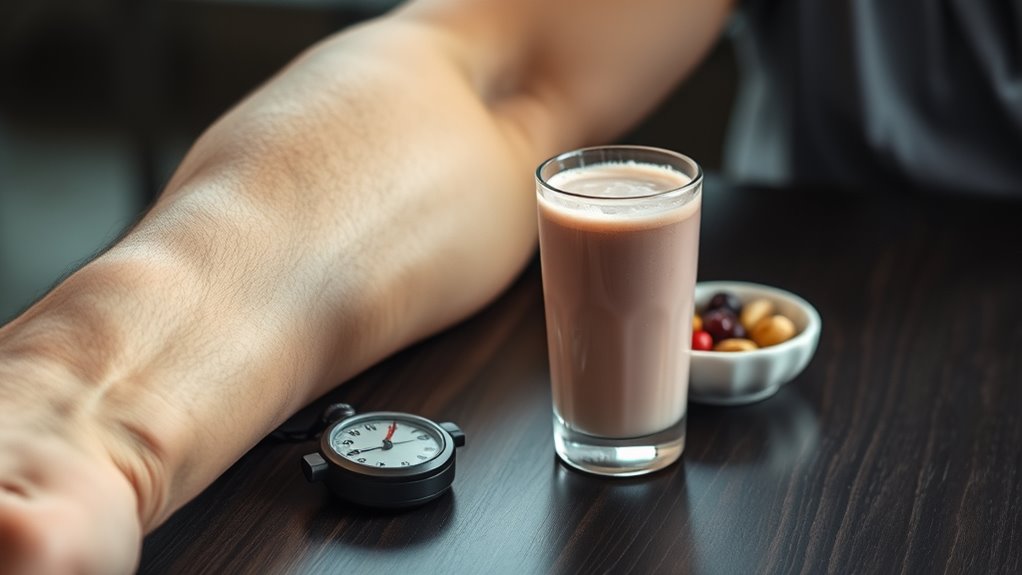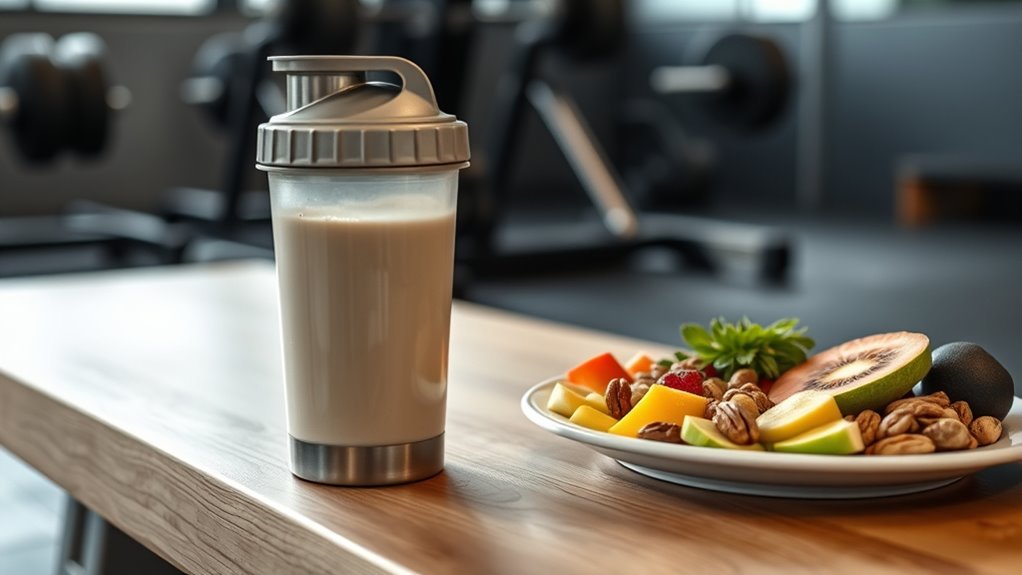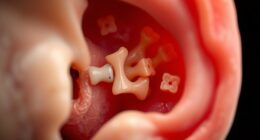Focusing on your total daily protein intake is more important for muscle recovery than timing it precisely around your workouts. While consuming some protein shortly after exercise can help, recent research shows that spreading your intake evenly throughout the day maximizes results. The so-called “anabolic window” isn’t as critical as once believed. To get the most from your efforts, guarantee you meet your daily protein goals—more details on how to optimize your nutrition follow.
Key Takeaways
- Total daily protein intake is more important than precise timing for muscle recovery.
- Consuming protein within 30 minutes to two hours post-workout can support optimal muscle repair.
- Fast-absorbing proteins like whey are ideal immediately after exercise, while slow-digesting proteins aid overnight recovery.
- Spreading protein intake evenly across meals ensures a steady supply of amino acids for muscle repair.
- Maintaining consistent protein intake on rest days and before bed promotes continuous muscle recovery.
The Role of Protein in Muscle Repair

Protein is essential for muscle repair because it provides the building blocks your body needs to recover and grow after exercise. When you work out, tiny tears form in your muscle fibers, signaling your body to repair and strengthen them. Protein supplies amino acids, which are the fundamental components for rebuilding these fibers. Without enough protein, your muscles won’t recover efficiently, increasing the risk of soreness and injury. Consuming adequate protein helps to reduce muscle breakdown and promotes growth, ensuring your muscles become stronger over time. It’s especially important after intense workouts, as your body needs these nutrients to kickstart the repair process. Additionally, proper air quality can influence recovery by supporting overall health and reducing inflammation. By prioritizing protein intake, you support ideal recovery and lay the foundation for muscle development.
Understanding the Timing Window for Protein Intake

You should consider when to consume protein after your workout to maximize recovery. The post-workout window is often seen as the prime time for intake, but timing strategies can vary. Understanding these *best* periods helps you get the most benefit from your protein consumption. For optimal results, consuming protein within the first 30 to 60 minutes after exercise is generally recommended, aligning with the concept of a protein timing window for muscle repair and growth.
Post-Workout Window
The post-workout window is often considered a critical period for maximizing muscle recovery, as your muscles are particularly receptive to nutrients after exercise. During this time, consuming protein helps repair and rebuild muscle fibers more effectively. Ideally, aim to eat within 30 to 60 minutes post-exercise to *maximize* results. Your choice of protein, timing, and amount can influence recovery speed and muscle gains. To better understand your options, here’s a quick comparison:
| Protein Type | Absorption Rate | Best Use |
|---|---|---|
| Whey Protein | Fast | Immediate post-workout |
| Casein Protein | Slow | Overnight, prolonged release |
| Plant-Based Protein | Moderate | Recovery, daily intake |
| Supplement Timing | Critical | Within 1 hour for *optimal* |
| Protein Quantity | Varies | 20-40 grams per serving |
Consuming the right type of protein at the right time aligns with the concept of nutrient timing, which is crucial for enhancing muscle repair and growth.
Optimal Timing Strategies
Maximizing muscle recovery depends heavily on timing your protein intake effectively. To optimize results, aim to consume protein within a window of about 30 minutes to two hours after your workout. This period, often called the “anabolic window,” helps your muscles absorb nutrients when they’re most receptive. However, recent research suggests that the timing isn’t as strict as once thought; total daily protein intake matters more. Still, if you want to maximize recovery, prioritize a fast-absorbing protein source like whey post-exercise. Distributing your protein evenly across meals throughout the day also supports muscle repair. Additionally, regional legal resources can provide guidance on navigating health and nutrition regulations in your area. Ultimately, focus on consistent, adequate protein consumption aligned with your workout schedule to enhance recovery and muscle growth.
Post-Workout Protein Consumption: Is It Essential?

Many fitness enthusiasts believe that consuming protein immediately after a workout is crucial for ideal muscle recovery, but recent research suggests the timing may not be as essential as once thought. The key is overall daily protein intake, rather than pinpoint timing. If you can’t eat right after, don’t stress; your muscles will still benefit from regular protein consumption. Focus on spreading your intake evenly throughout the day. Some useful points to consider:
- Muscle repair continues hours after exercise
- Total protein intake matters more than timing
- Your body can use protein efficiently even if delayed
- Immediate post-workout protein isn’t a magic fix
- Consistency over time yields better results
- Protein timing is less critical than overall intake for muscle recovery
Ultimately, prioritize your daily protein goals and maintain a balanced diet for optimal recovery.
Pre-Bed Protein Intake and Muscle Growth

Consuming protein before bed can support muscle growth and recovery overnight, especially when combined with your overall daily intake. When you have a slow-digesting protein like casein before sleep, it provides a steady release of amino acids throughout the night. This helps prevent muscle breakdown and promotes repair while you rest. Incorporating a pre-bed protein snack or shake can maximize muscle protein synthesis during a critical recovery window. It’s especially beneficial if you’ve trained hard that day or are in a muscle-building phase. Just ensure your overall daily protein intake meets your needs, so that the pre-bed serving complements your goals. Additionally, maximize space and organization in your meal prep area can make it easier to prepare and plan your pre-bed nutrition, ensuring consistency. This strategy can improve your gains by supporting continuous repair and growth during your sleep cycle.
How Much Protein Should You Consume at Different Times?

The amount of protein you need at different times depends on your activity level, goals, and overall daily intake. For most people, aiming for about 20-30 grams of protein per meal supports muscle recovery and growth. After workouts, consuming a protein-rich snack or meal within an hour helps jumpstart the repairing process. If you’re trying to build muscle, spreading protein evenly throughout the day can maximize benefits. On rest days, maintaining a steady intake ensures your muscles stay nourished. Remember, over-consuming protein at specific times doesn’t necessarily lead to faster gains. Focus on total daily intake, and adjust based on your activity. Recognizing patterns in angel numbers can also help you align your nutrition and training schedule for optimal results.
- Post-workout: 20-30 grams helps rebuild muscles
- Breakfast: kickstart your day with protein
- Lunch and dinner: distribute evenly
- Rest days: keep steady intake
- Before bed: support overnight recovery
The Science Behind Protein Synthesis and Timing

Understanding how your body builds and repairs muscle involves exploring the process of protein synthesis. When you exercise, your muscle fibers experience small tears, signaling your body to repair and grow stronger. Protein synthesis is the process where your cells create new proteins to rebuild damaged fibers. Timing matters because this process is most active shortly after your workout, especially within the first couple of hours. Consuming protein during this window supplies the necessary amino acids quickly, boosting synthesis rates. If you delay intake, your body’s ability to efficiently repair diminishes, and recovery slows. This period is often referred to as the anabolic window, emphasizing the importance of timely nutrition for optimal results. By understanding this cycle, you can optimize your nutrition to enhance muscle repair and growth, ensuring you get the most benefit from your training sessions.
Common Myths About Protein Timing Debunked

Many believe that timing your protein intake is vital, but that’s not entirely true. Focusing solely on when you eat protein overlooks the importance of your total daily intake. Plus, the idea that post-workout protein is the only essential moment isn’t supported by the latest science. Incorporating glycolic acid into your skincare routine can also improve skin texture and appearance, highlighting the benefits of consistent, well-timed care.
Timing Doesn’t Matter
Despite popular beliefs, timing your protein intake precisely around workouts doesn’t substantially boost muscle recovery or growth. The idea that you need to consume protein within a narrow window after exercising is a myth. What truly matters is your overall daily protein intake, not the exact timing. Your body can effectively utilize protein consumed hours before or after your workout. Instead of stressing over perfect timing, focus on spreading protein evenly across meals throughout the day. Remember, consistency beats timing. Prioritize hitting your daily protein goals, and your muscles will recover and grow just fine. Don’t get caught up in the details—your body’s ability to adapt and use protein is what counts. Additionally, protein absorption occurs over several hours, allowing flexibility in meal timing.
Total Intake Is Key
While it’s tempting to focus on the timing of your protein intake, studies show that your total daily protein consumption is far more important for muscle recovery and growth. Consuming enough protein overall guarantees your body has the amino acids needed for repair and building new muscle tissue. Skimping on your daily intake can hinder progress, regardless of when you eat protein. Many myths suggest that timing is everything, but research indicates that hitting your overall protein goals consistently matters more. Whether you spread your intake evenly or consume larger amounts at certain times, the key is meeting your daily target. Prioritize your total intake, and the benefits will follow, no matter the specific timing.
Post-Workout Not Crucial
Focusing solely on eating protein immediately after your workout isn’t necessary for muscle recovery. Your body can effectively utilize protein hours after exercise, so don’t stress about perfect timing. The idea that you must consume protein within a 30-minute window is a myth. Instead, focus on your overall daily intake. Here are some facts to keep in mind:
- Muscle repair happens over hours, not minutes.
- Consuming protein throughout the day is more important than timing.
- Your body stores amino acids for later use.
- The “anabolic window” is longer than you think.
- Consistency in your diet matters more than post-workout timing.
Relax and prioritize steady protein intake—you’ll still build muscle effectively.
Practical Strategies for Optimizing Protein Intake Throughout the Day

To maximize muscle recovery, distributing your protein intake evenly throughout the day is essential. Aim to include a source of protein in every meal and snack to keep amino acid levels steady. Prioritize high-quality proteins like lean meats, dairy, eggs, or plant-based options such as beans and tofu. Planning your meals ahead helps guarantee consistent intake, preventing long gaps without protein. Consider consuming a small protein-rich snack post-workout to jumpstart recovery. Spreading your intake this way optimizes muscle repair, supports growth, and minimizes muscle breakdown. Remember, balance and consistency are key. By making protein a regular part of your daily routine, you’ll improve your chances of faster recovery and better muscle development over time.
Frequently Asked Questions
Does Protein Timing Vary for Different Age Groups or Fitness Levels?
You might wonder if when you eat protein matters based on your age or fitness level. The answer is yes; younger people and those with higher fitness goals often benefit from more precise timing to maximize muscle repair and growth. As you age or increase your activity, spreading protein intake throughout the day and consuming it after workouts can help preserve muscle mass and improve recovery, tailored to your specific needs.
Can Plant-Based Proteins Be as Effective as Animal Proteins for Recovery?
Think of plant-based proteins as versatile tools in your recovery toolkit. They can be just as effective as animal proteins if you select a variety of sources like beans, lentils, and soy. While they may have slightly lower levels of certain amino acids, combining them guarantees you’re building a complete profile. With proper planning, you can fuel your muscles and recover just as powerfully, regardless of your protein source.
How Does Carbohydrate Intake Influence the Effectiveness of Protein Timing?
Carbohydrate intake plays a vital role in maximizing protein’s effectiveness after exercise. When you consume carbs with protein, your body releases insulin, which helps shuttle amino acids into muscles more efficiently. This boosts muscle repair and growth. Without enough carbs, your recovery might slow down. So, to get the best results from your protein timing, include some healthy carbs post-workout to enhance muscle rebuilding.
Are There Specific Timing Strategies for Endurance Athletes Versus Strength Athletes?
You should tailor your protein timing based on your athletic focus. Endurance athletes benefit from consuming protein shortly after workouts to support muscle repair and recovery, especially when combined with carbs for glycogen replenishment. Strength athletes, on the other hand, often spread protein intake evenly throughout the day and around training sessions to maximize muscle synthesis. Adjust your timing to match your training intensity and goals for ideal results.
What Role Do Supplements Play in Optimizing Protein Timing for Muscle Recovery?
Imagine fueling your muscles like a well-oiled engine after a long drive. Supplements act as quick, targeted fuel boosts, helping you recover faster and more efficiently. They provide essential amino acids when your body needs them most, bridging gaps between meals. By strategically incorporating supplements, you optimize your protein intake, support muscle repair, and get back to training stronger and ready for the next challenge.
Conclusion
So, next time you’re pondering whether to chug a protein shake immediately after lifting or just before bed, remember: your muscles probably won’t throw a tantrum if you skip a few hours. The real secret? Consistency over obsessing over every minute. So relax, enjoy your gains, and don’t stress if your timing isn’t perfect—your muscles will survive. After all, they’re pretty resilient, unlike your desperate attempts at perfect timing.









